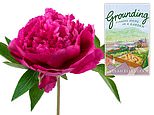I pruned my way from gloomy to bloomy!
I pruned my way from gloomy to bloomy! Writer Lulah Ellender explores the grief she felt when her family home was sold so quickly after her mother’s death
For writer Lulah Ellender salvation lay in a flower-filled garden with a high hedgeShe found grief in losing her beloved garden shortly after her mother’s deathThe book explains how important our own patch of ground is to our identity
<!–
<!–
<!–<!–
<!–
(function (src, d, tag){
var s = d.createElement(tag), prev = d.getElementsByTagName(tag)[0];
s.src = src;
prev.parentNode.insertBefore(s, prev);
}(“https://www.dailymail.co.uk/static/gunther/1.17.0/async_bundle- -.js”, document, “script”));
<!–
DM.loadCSS(“https://www.dailymail.co.uk/static/gunther/gunther-2159/video_bundle- -.css”);
<!–
NATURE
GROUNDING
by Lulah Ellender (Granta £16.99, 285pp)
What do you do when you feel overwhelmed by grief and uncertainty? Some sink into depression, some turn to counselling, others seek solace in drink or drugs.
For writer Lulah Ellender, salvation lay in a flower-filled garden ‘with a high overgrown hedge on one side and an ancient brick wall along the other’.
Lulah Ellender’s new book Grounding explores how she found salvation in her flower-filled garden after the home she had shared with her mother was sold quickly after her mother’s death
Ellender and her family had been living in a rented property in Sussex for ten years when, shortly after their landlord’s death, someone at a dinner party cheerily informed her: ‘My aunt is buying your house.’
Ellender had already moved home 20 times (the average person moves seven times in their life), and the prospect of having to do so again, losing the garden she loved so much, was unbearable. Combined with grief at her mother’s recent death and her gloom at the state of the world in general, it was enough to send her into a tailspin of despair.
Her memoir starts in the cold, sharp days of March when, as Dickens wrote, ‘it is summer in the light, and winter in the shade’. Everywhere Ellender looks there are painful reminders of how the family’s history is woven into the garden: the fig tree that was a 40th birthday present, the places where her children built secret dens, the lawn on which they sprawled as they revised for exams. ‘Every part of a garden is underplanted or overlaid with memories,’ she mourns.
Probate on their landlord’s estate drags on and on, and when they are given a temporary stay of execution she has a lightbulb moment: ‘Living with uncertainty need not mean living dejectedly.’
She decides that caring for the garden, even if it is only hers for a few more months, is not a waste of effort but ‘a modest and quiet act of defiance’.
As Ellender plants her vegetable patch and watches the swifts swoop and dive overhead, she ponders why losing this garden seems like such a wrench. She traces it back to the Wiltshire garden which was her childhood playground, a place of ‘perpetual summers’.
After her parents split, she and her mother moved house, and she changed from a happy child to a surly teenager.
The loss of that place, she realises, has continued to haunt her. But as she toils in the garden, weeding and planting and pruning, she gradually finds a sense of perspective returning.
Gardening, she finds, is excellent therapy, a theory backed by scientific research, which has shown ‘greenery and natural landscapes increase feelings of wellbeing …enhanced when we have some part in the creation of that space’.
GROUNDING by Lulah Ellender (Granta £16.99, 285pp)
Ellender is at her best when she is evoking the sights, smells and textures of her garden. Looking at the spring foliage, she is enchanted by ‘endless degrees of green: the deep, spinach green of the hedge; the vivid chlorophyll carpet of grass; the pale artichoke of unfurling leaves’. In summer, when she and her daughter are picking elderflowers to make cordial, ‘I feel like I am plucking dollops of scented stars from the sky and passing them down to her’.
And anyone who has battled with ground elder will recognise her pithy description of its invasive roots as ‘infinite spaghetti’.
After six months of solid gardening, Ellender has regained her balance. ‘I will practise gratitude instead of worrying about the future,’ she vows. ‘I will acknowledge the sheer, glorious privilege of witnessing my garden grow; my children grow; of being alive.’
If the family has to leave the house, she concludes: ‘It will be difficult and sad… but we will survive, and someone else will come to love it as I do.’
In a postscript, she reveals that the new owner wanted them to stay, and she is filled with excitement ‘for the flowers and plants to come’.
At times, Grounding can feel too self-indulgent. Whatever happens, Ellender and her family are not going to be homeless or destitute, and it’s hard to read it without thinking of the plight of the many people driven forcibly from their homes and gardens in the past few weeks.
Yet Ellender does beautifully capture just how important our own patch of ground is to our sense of identity. ‘No garden is ever made in vain,’ she writes. ‘The imagining, the creation, the care and the bounty — these all have value in themselves.’
![]()


